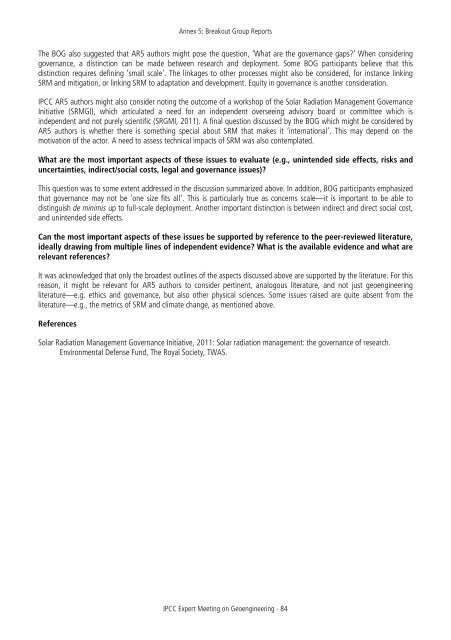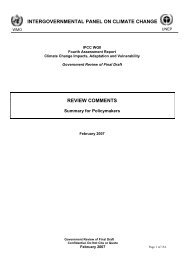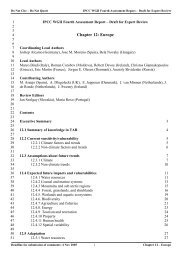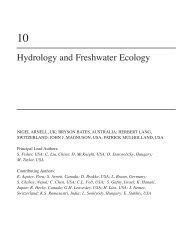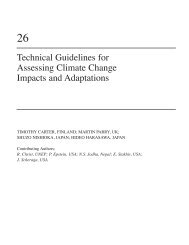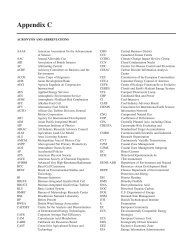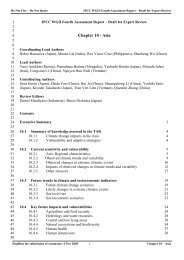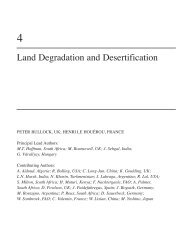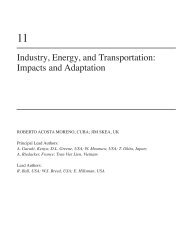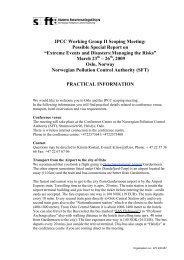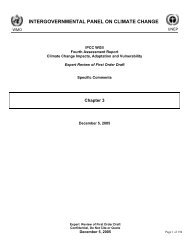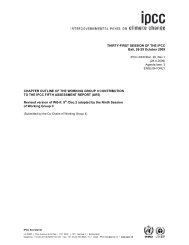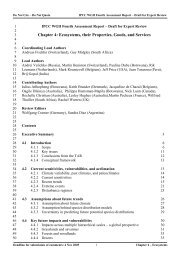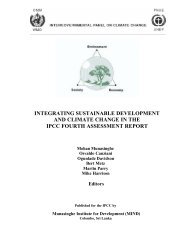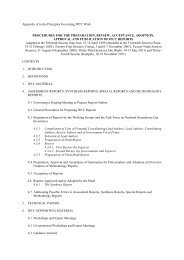IPCC Expert Meeting on Geoengineering
IPCC Expert Meeting on Geoengineering
IPCC Expert Meeting on Geoengineering
Create successful ePaper yourself
Turn your PDF publications into a flip-book with our unique Google optimized e-Paper software.
Annex 5: Breakout Group Reports<br />
The BOG also suggested that AR5 authors might pose the questi<strong>on</strong>, ‘What are the governance gaps?’ When c<strong>on</strong>sidering<br />
governance, a distincti<strong>on</strong> can be made between research and deployment. Some BOG participants believe that this<br />
distincti<strong>on</strong> requires defining ‘small scale’. The linkages to other processes might also be c<strong>on</strong>sidered, for instance linking<br />
SRM and mitigati<strong>on</strong>, or linking SRM to adaptati<strong>on</strong> and development. Equity in governance is another c<strong>on</strong>siderati<strong>on</strong>.<br />
<str<strong>on</strong>g>IPCC</str<strong>on</strong>g> AR5 authors might also c<strong>on</strong>sider noting the outcome of a workshop of the Solar Radiati<strong>on</strong> Management Governance<br />
Initiative (SRMGI), which articulated a need for an independent overseeing advisory board or committee which is<br />
independent and not purely scientific (SRGMI, 2011). A final questi<strong>on</strong> discussed by the BOG which might be c<strong>on</strong>sidered by<br />
AR5 authors is whether there is something special about SRM that makes it ‘internati<strong>on</strong>al’. This may depend <strong>on</strong> the<br />
motivati<strong>on</strong> of the actor. A need to assess technical impacts of SRM was also c<strong>on</strong>templated.<br />
What are the most important aspects of these issues to evaluate (e.g., unintended side effects, risks and<br />
uncertainties, indirect/social costs, legal and governance issues)?<br />
This questi<strong>on</strong> was to some extent addressed in the discussi<strong>on</strong> summarized above. In additi<strong>on</strong>, BOG participants emphasized<br />
that governance may not be ‘<strong>on</strong>e size fits all’. This is particularly true as c<strong>on</strong>cerns scale—it is important to be able to<br />
distinguish de minimis up to full-scale deployment. Another important distincti<strong>on</strong> is between indirect and direct social cost,<br />
and unintended side effects.<br />
Can the most important aspects of these issues be supported by reference to the peer-reviewed literature,<br />
ideally drawing from multiple lines of independent evidence? What is the available evidence and what are<br />
relevant references?<br />
It was acknowledged that <strong>on</strong>ly the broadest outlines of the aspects discussed above are supported by the literature. For this<br />
reas<strong>on</strong>, it might be relevant for AR5 authors to c<strong>on</strong>sider pertinent, analogous literature, and not just geoengineering<br />
literature—e.g. ethics and governance, but also other physical sciences. Some issues raised are quite absent from the<br />
literature—e.g., the metrics of SRM and climate change, as menti<strong>on</strong>ed above.<br />
References<br />
Solar Radiati<strong>on</strong> Management Governance Initiative, 2011: Solar radiati<strong>on</strong> management: the governance of research.<br />
Envir<strong>on</strong>mental Defense Fund, The Royal Society, TWAS.<br />
<str<strong>on</strong>g>IPCC</str<strong>on</strong>g> <str<strong>on</strong>g>Expert</str<strong>on</strong>g> <str<strong>on</strong>g>Meeting</str<strong>on</strong>g> <strong>on</strong> <strong>Geoengineering</strong> - 84


